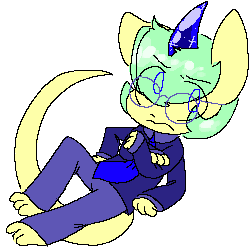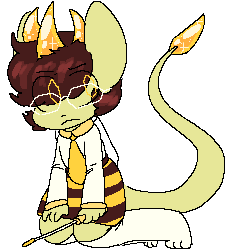Magnitude Fragments
Note that most of this page was made for larger screens; images will not display on mobile to improve readability.
Introduction
Magnitude Fragments (Mag Frags) are a group of thirty-three deities, existing outside of spacetime itself. Omnipotent reality warpers, they are manifestations of the integral structures of the world - of the shapes that make up all of reality.
The majority were born, accidentally, at the start of the world, as Genesis - the creator deity - constructed the first Timelines, using geometry as a base to form the physical world. Supercharged by Genesis' magic, those shapes gained sentience, forming integral structures upon which the world's foundations were laid.
As beings so intimately tied to reality, Mags have a great amount of influence over it. Timelines collapse or rebuild at their whim, their magic is nigh-endless, and the very rules of existence bend to their will. While this might invoke fear, thankfully, Mags are inherently idealistic, and wish to preserve the world and embetter it in any and all ways.
Of course, being egotistical reality warping deities mean that they all have their own opinions on how best to improve the mess of a world Genesis left behind....
Culture
Mags' culture is deeply tight-knit and intimate, as there are only thirty-three of them. Isolated from the rest of reality, they have grown extremely close to one another, and are exceedingly accepting of each other's faults and mistakes. With the expectation that no other Mags will ever exist, there's no point in souring the bonds between the few that do.
They do attempt to keep their distance from mortals, however, under Pyatiugolnik's rules. Though some meddle anyways, it is generally somewhat frowned upon. (That doesn't stop the myriad of strong personalities among the group, of course.)
They are very fond of one another, generally protective, and quick to jump to one another's defense. Things that seem extreme to mortals are typical to Mags - as they barely comprehend things like "death" in the context of mortality, they might seriously discuss removing belligerent mortals by simply eradicating them.
Even the most violent among them is handwaved - and if they are genuinely causing problems, it's primarily seen as a phase. They'll eventually get over it and return to the Mags' home - why not? With infinite time, everything eventually happens.
They generally do not bore easily, and view creation in a mixture of awe and adoration. They enjoy giving themselves "impossible tasks" - things that are difficult to accomplish, even for them, that give them a sense of purpose and fulfillment.
Sex and romance are more akin to open relationships/polyamory than monogamy. Mags freely date and sleep with any of their group, and have little to no concept of "cheating".
Gender is barely an afterthought; Mags do not ascribe any words to their genders, as it simply doesn't occur to them. In general, they prefer he/him pronouns, but present as they please. Clothes, outfits, and bodies in general are not gendered in Numbers.
Appearances
Mags' physical forms are mere finger puppets - things they use to better communicate with the largely-physical world around them. Their true selves are conceptual: massive forms of their integral structure, and incomprehensible to mortals.
As such, they have full control of their physical appearance, and can change their body as they please. In general, though, their eyes reflect what shape they are, and they all sport at least one large horn on their heads. Though these are not "rules", per se, and can be altered, Mags feel most comfortable presenting with them.
Their heights vary, especially depending on where they are. When around mortals, who have a less fuzzy concept of heights, they trend towards a range in which Dijamant is always the tallest, and Quantum is always the shortest. Even then, their heights are still inconsistent, and are in constant fluctuation.
Magtown/Home
Mags' home exists outside of spacetime, in a large niche they've carved out for themselves. Mortals' brains struggle to parse it, seeing superimposed layers of various homes, biomes, and environments, but with time and exposure they can learn to navigate it as well. Though most areas are public use and free for any Mags to influence, they generally try not to intrude on one another's creations or territory, instead building their own and expanding the range of Magtown.
It is a mixture of many different locations, all created by the Mags themselves. Their houses scatter the landscape, a mix of actual buildings, castles, temples, and strange, towering structures. Though distinctly alien, it also feels intimately familiar and safe.
With the ambient Magninium in the air, visitors and Mags alike are always drawn to wherever they want to go in a few steps, even if physically the two locations are on opposite sides of the town. Mortals cannot teleport to town; they must conceptwalk there or tag along with a Mag.
Mags also do not refer to it as "Magtown", but call it "home" instead. The COR records it as "Mags' town" or "Magtown".
Powers
Reality Warping
Mags can warp reality to their heart's content, with the only exception being that they cannot warp each other's fundamental concepts (see Conceptual). They can freely change anything, down from the rules of the universe at large to just a single individual. They can also alter each other's rules or changes, though stronger Mags can overpower weaker Mags and warp reality faster.
Mags cannot alter each other's structures, minds, or concepts (you cannot strip "circles" from Kolo) but they can alter one another's appearances readily. Mind control magic does not work on each other, though they can use it on mortals.
In order, the strongest Mags are: Juice/Farley, Pyatiugolnik, Dijamant, Peresekat/Rendgen, Zehneck, and Pravougaonik. The others are too close in power; their rankings are negligible.
Magic
Though Mags tend towards reality warping rather than casting, as sentient beings in Numbers (and some of the largest sources of Magninium there are) they can use magic if they wish. Their reserves are so vast that it is akin to reality warping to them, and gold/silver/copper torture is only mildly irritating at best, rather than deadly.
Their massive reserves mean that they are constantly oozing a massive quantity of magic into the atmosphere. When first exposed to their radiation, mortals' brains automatically align onto the Mags' emotions and wants, following them passively and without sense, like a zombie.
Mortals who become used to this radiation feel comforted and safe in Mags' presences, and ambiently feel their emotions. In general, they tend to trust Mags, though they retain their minds.
Invocation
As Mags govern a wide array of concepts, it is possible to contact them by aligning oneself with said concepts. Usually, this is done as a form of worship, prayer, or a call for help - as the Mags can sense when someone resonates with their energies and might respond if they can feel distress through them.
In general, one should surround themselves with objects concerning the Mags' concepts, channel a large amount of magic through them, and attempt to align themselves with those concepts. Frags Blessed by Mags tend to have an easier time calling on their blessers, and it is easiest for mortals to connect with the Mags whose concepts they already mirror (i.e. someone with crescent pupils might align easiest to Polumesec's energies.)
It is exceedingly rare, but mortals familiar enough with types of invocation are capable of temporarily inserting themselves into the conceptual plane.
Obstruction
To prevent harming mortals' brains or in order to avoid being sensed by other Mags, Mags may "obstruct" their radiation. Physically, the only change is their pupils' eye being filled in, but their mind-warping aura dissipates and it becomes harder to notice them. Their presence is no longer instantly sensed by those attuned to them, either.
The sensation, to Mags, is not unlike holding their breath - annoying and only usable in small doses - but they can hold it for much longer than a mortal can hold air. Still, they find it aggravating and prefer not to, if possible.
Obstruction also prevents invocations from going through, as Mags are intentionally shielding their concepts from scrutiny.
Conceptual Plane
Mags are inherently creatures of the conceptual plane, and often communicate through it. They find it pleasurable to interact with one another through it, and see mortals' true conceptual selves intuitively. Highly intimate and personal, they do not touch another's conceptual selves without permission.
Their concepts include their "selves" (i.e. Kolo is a circle) and aspects of their external identity that they have accepted as part of themselves (Kolo writes, so stories are one of his external concepts). These external concepts can be shed and exchanged if the Mag no longer considers them a self-aspect. So, Dijamant can alter the concepts of stories in Timelines and to mortals, but cannot alter Kolo's own concepts and ideas about storytelling, and his magic will defer to Kolo's wishes if they conflict over it.
Mags' concepts are so strong they passively warp mortals they are around, even if the mortals have become used to their magical radiation. Mortals will pick up traits and quirks from them.
"Love Juice"
As a byproduct of being conceptual creatures constantly interacting on that surface as well as physical, Mags' concepts and magic are communicating at all times when near one another. This manifests as a satisfying feeling of empathy, warmth, communication, and adoration, which they feel strongest when looking at each other. This feeling goes by many names, but "love juice" is one of the simplest.
Love juice becomes stronger and more overwhelming the closer two Mags are conceptually - either in distance, or in selves. Ellipsa and Kolo, for example, are both rounded structures, and so experience stronger love juice between them; but it also becomes stronger if they are in proximity to each other.
Mortals also feel ambient love juice, which makes them more susceptible to Mags' influence and desires. They feel compulsions to obey Mags' commands, even if obstructed, and ambiently desire physical affection.
Fusion
Mags can fuse with one another, melding their concepts and personality to form a new structure. They are almost always more complex shapes, often difficult for mortals to comprehend.
Fusion is a very physical process - normally done through hugging, with both parties expressing an internal desire to be with the other person for as long as possible. As their concepts reach the same "wavelength", they will fuse, and remain as such until they desync. Normally, this is caused by severe disagreements. While fused, they share their minds, thoughts, feelings, and perspectives, and pilot their fusion together in tandem with the fusion's lesser personality itself.
Fusion does not have an upper limit to people that can combine, but the more people in a fusion, the more difficult it becomes to uphold, as all parties must be synced together.
Blessing
Mags can give (usually) Frags a small portion of their magic. Though negligible to the Mag, it is a great boon to the Frags, who gain more magic, power, influence, and concepts aligning to their Blesser. Blessings cannot be removed or doubled-up, though each Mag can Bless the same Fragment once.
Blessed Frags have an easier time invoking their respective Blessers, and typically become knowledgeable about the Mags' concepts.
Some Mags, like Zvezda, give Blessings out so often that they've become culturally negligible. Others, like Pyatiugolnik, have given so few Blessings that the rare few who obtained them are of great importance and are highly scrutinized.
Glossary
MAG/MAG FRAG… all synonyms for Magnitude Fragments. Usually the terms used to describe them, as it's less of a mouthful.
FRAGMENTS/FRAG… a kind of lesser Mag, born when Genesis and Bereave split into their component parts. They are generally less powerful than Mags, but also subsist outside of spacetime and protect Timelines.
INTEGRAL STRUCTURE… the term for describing what a Mags' true self is - i.e. Kolo, who represents circles, is the 'integral circle structure'.
Magic
MAGNINIUM… the source of both sentience and magic in Numbers. Vast quantities are the signifiers of personhood and sentience, and vaster yet are signifiers of godhood. Magnitude Fragments have the most magic of any living being.
MAGNINIUM CYCLE… the cycle in which Magninium is used by sentient beings, released upon their death, and recycled into more magic or life.
TIMELINES… vast arrays of spacetime in which mortals and their kin survive. They are integral to the greater Magninium cycle's sustainability, and are preserved by Mags and Frags.
MAIN TIMELINE… the "canon" Timeline, which stabilized the rest and created a number of branching Timelines based off of its contents. The first Timeline that was stable and secure, and the most precious. It is highly regulated and OOT actors are expressly forbidden.
ORIGINAL 24… when Genesis first created the world, he crafted 24 Timelines before creating the Main Timeline - the Timeline off which most are now based. The original 24 had associated Mag "guardians" and were exceedingly unstable and prone to collapse. They still exist, although OOT actors and Frags are expressly forbidden from entering them, for fear of destabilizing them further.
OOT ACTORS… shorthand for "out-of-Timeline actors". Timelines are at their most stable when no one from outside of them interferes, as they are pre-programmed to conform to the actions of their true residents. Too many OOT actors inside of a Timeline destabilizes it, and may eventually result in its complete death. Mags' presence stabilizes Timelines, but Frags' do not.
GOD SPECTRUM… the word for the "ladder" upon which Magninium scales. Different "ladder steps" signify different amounts of godhood. In order of least strongest to most, the spectrum is as follows: Mortals->Immortals->Lesser Gods->Harmonics/Chaotics->Gladar->Frags->Mags
Religion
CREATOR DEITIES… a term encompassing both Genesis and Bereave, two halves of the initial Singularity, from whence all Magninium and creation came from. Despite the title, only Genesis created the known world.
SINGULARITY… one of many names for the progenitor of all life, in which all Magninium was once contained. Singularity ripped itself apart to form Genesis and Bereave, with Genesis taking the majority of the creation magic and Bereave the destruction.
MAG RESEARCHERS… as Mags are fairly reclusive (with the exception of Shestiugolnik), their existence is a point of interest for many. Researchers catalogue all known information about their existences, concepts, and seek to understand them. Though not strictly religious in the sense of humans, many Frags do consider the Mags to be deities.
MAG CULTISTS… rarer than the Researchers, Mag cultists have dedicated themselves in worship of certain (or all) Mags. Though each sect differs in exact beliefs, they trend towards upholding and idealizing the Mags as deities, oftentimes pursuing them to express devotion. The sects range from fairly-tame Frags and mortals who align with a Mags' concepts and quietly indulge in them, to full-blown religions involving sacrifice and rituals.
Conceptual
CONCEPTS… everything in Numbers' magic aligns with a certain "conceptual wavelength" - things that resonate, feel close to them, and are an extended part of their identity. Mortals who draw, for example, align with concepts of creation, drawing, illustration, etc. Stronger entities are more in-tune to their conceptual energies, especially Mags, who are highly attuned to concepts.
CONCEPTUAL SELF… the collage of concepts that one's true self makes up. It is only visible in the conceptual plane, and can be made up of literally anything - from certain visuals, to audio, to sensations. It may change with time, but typically not vastly.
MAG INFLUENCE… mortals who spend too much time around Mags begin to reflect their concepts, as Mags' conceptual selves are constantly being radiated and are expressly powerful. This can result in changes both to the conceptual self and physical self.
CONCEPTWALKING… the ability to walk the conceptual plane, interact with others' conceptual selves, and cross the void outside of spacetime without danger to the self. It is exceedingly difficult for mortals to learn to do.


